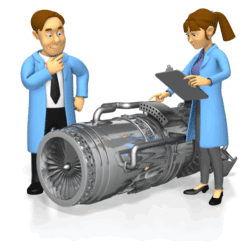All the performance indicators on the NHSE cockpit dashboard show that it is on a downward trajectory.
The NHS engines are no longer effective enough or efficient enough to keep the NHS airship safely aloft.
And many sense the impending crash.
Scuffles are breaking out in the cockpit as scared pilots and anxious politicians wrestle with each other for the controls. The passengers and patients appear to be blissfully ignorant of the cockpit conflict.
But the cockpit chaos only serves to accelerate their collective rate of descent towards the hard reality of the Mountain of Doom.
So what is needed to avoid the crash?
Well, some calm and credible leadership in the cockpit would help; some coordinated crash avoidance would help too; and some much more effective and efficient engines to halt the descent and to lift us back to a safe altitude would help too. In fact the new NHS engines are essential.
But who is able to design, build, test and install these new health care system engines?
We need competent and experienced health care system engineers.
And clearly we do not have enough because if we had, we would not be in a CFIT scenario (cee fit = controlled flight into terrain).
So why do we not have enough health care system engineers?
Surely there are appropriate candidates and surely there are enough accredited courses with proven track records?
I looked. There are no accredited courses in the UK and there are no proven track records. But there appears to be no shortage of suitable candidates from all corners of the NHS.
How can this be?
The answer seems to be that the complex flow system engineering science needed to do this is actually quite new … it is called Complex Adaptive Systems Engineering (CASE) … and it has not diffused into healthcare.
More worryingly, even basic flow engineering science has not either, and that seems to be because health care is so insular.
So what can we do?
The answer would seem to be clear. First, we need to find some people who, by chance, are dual-trained in health care and systems engineering. And there are a few of them, but not many.
People like Dr Kate Silvester who trained as an ophthalmic surgeon then retrained as a manufacturing systems engineer with Lucas and Airbus. Kate brought these novel flow engineering skills back in to the NHS in the days of the Modernisation Agency and since then has proved that they work in practice – as described in the Health Foundation Flow-Cost-Quality Programme Report.
Second, we need to ask this small band of seasoned practitioners to design and to deliver a pragmatic, hands-on, learning-by-doing Health Care Systems Engineer Development Programme.
The good news is that, not surprisingly, they have already diagnosed this skill gap and have been quietly designing, building and testing.
And they have come up with a name: The Phoenix Programme.
And because TPP is a highly disruptive innovation they know that it is too early to give it a price-tag, so they have generously offered a limited number of free tickets to the first part of TPP to clinicians and clinical scientists.
The first step is called the Foundations of Improvement Science in Healthcare online course, and better known to those who have completed it as “FISH”.
This vanguard of innovators have shared their feedback.
And, for those who are frustrated and curious enough to explore outside their comfort zones, there are still some #freeFISH tickets available.
So, if you are attracted by the opportunity of dual-training as a clinician and as a Health Care Systems Engineer (HCSE) then we invite you to step this way.
And not surprisingly, this is not a new idea … see here and here.

